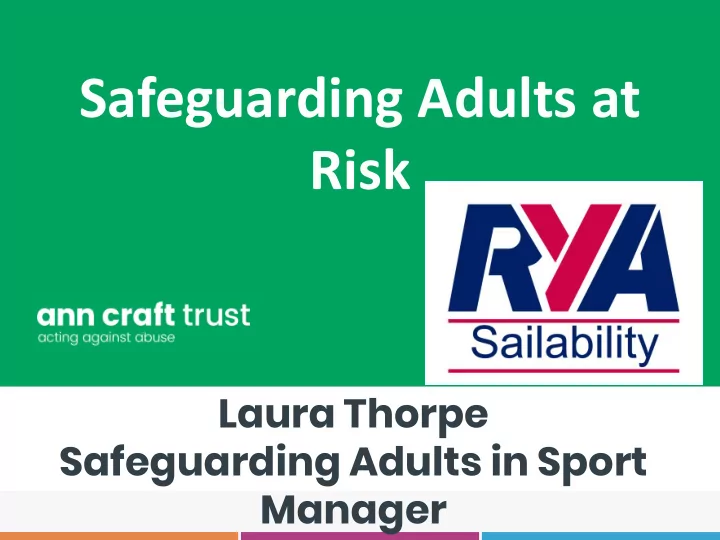

Safeguarding Adults at Risk Laura Thorpe Safeguarding Adults in Sport Manager
Introducing ACT Sign up for our safeguarding e-bulletins @ann_craft_trust www.anncrafttrust.org/subscribe
Setting the Scene • ‘ We know that feeling unsafe or excluded from sport is a significant barrier to getting involved in sport and physical activity for some groups’ • Sporting Future: A New Strategy for an Active Nation
Safeguarding • What does the word ‘safeguarding’ mean to you? • What makes you feel ‘safe’? • What makes you feel ‘unsafe’?
Safeguarding Adults Safeguarding means protecting an adult’s right to live in safety, free from abuse and neglect. It is about people and organisations working together to prevent and stop both the risks and experience of abuse or neglect, while at the same time making sure that the adult’s wellbeing is promoted (Care ACT 2014)
Why safeguard adults? • Statutory requirement • A government priority (Sporting Future) • ‘Safeguarding is everyone’s responsibility’
A person at risk of harm…… • ‘Has needs for care and support (whether or not the local authority is meeting any of those needs) and ; • is experiencing, or at risk of, abuse or neglect; • and as a result of those care and support needs is unable to protect themselves from either the risk of, or the experience of abuse or neglect’. [The Care Act 2014]
• Lonely • Involved with many different ‘professionals’ • Lack of support • Requires care/reliant on Adults at others to meet personal needs risk of • Not listened to or taken seriously harm • On the receiving end of could negative attitudes • Fear of intimidation be… • Lack of confidence • Lack of money/in debt/healthy bank account • Seen by others as an ‘unreliable witness’
• Compliant • Lack of insight/awareness • Perceived as being ‘odd’ (appearance, dress, mannerisms) Adults at • Homeless/accommodation issues risk of • Depression/mental health harm problems • Cognitive impairment e.g. could dementia • Immigration issues be… • Drug/alcohol issues • Poor/lack of communication skills • Person labelled as being ‘difficult’ or a ‘trouble maker’
When do you become an adult? 16 18 21 25
Care Act 2014 • From ‘vulnerable adults’ to ‘adults at risk’ • Radical overhaul of 60+ years worth of legislation • Care Act Guidance replaces No Secrets • Introduces a legal framework for adult safeguarding for the first time • Key changes to adult social care centre on new general duty to “Promote individual well - being” • Making Safeguarding Personal • Links to the Mental Capacity Act
Duty to Promote Individual Wellbeing- Care Act responsibility 1. physical and mental health, emotional well-being and personal dignity 2. protection from abuse and neglect 3. control by the individual over day-to-day life (including over care and support, or support, provided to the individual and the way in which it is provided) 4. participation in work, education, training or recreation 5. social and economic well-being 6. domestic, family and personal relationships 7. Suitability of living accommodation 8. the individual’s contribution to society
Six key safeguarding adults principles • Empowerment - People being supported and encouraged to make their own decisions and informed consent. • Prevention – It is better to take action before harm occurs. • Proportionality – The least intrusive response appropriate to the risk presented.
Six key safeguarding adults principles • Protection – Support and representation for those in greatest need. • Partnership – Local solutions through services working with their communities. Communities have a part to play in preventing, detecting and reporting neglect and abuse • Accountability – Accountability and transparency in delivering
Types of Abuse – Care Act 2014 • Physical • Sexual • Emotional/Psychological/Mental • Neglect and acts of omission • Financial or material abuse • Discriminatory abuse • Self-neglect • Domestic Violence • Modern slavery • Organisational abuse
Types of abuse not in the Care Act • Forced marriage • FGM • Radicalisation • Cyber-bullying • Mate/hate crime
The 5 core principles of the Mental Capacity Act (2005) 1. Always Assume Capacity 2.All Practical Help 3.Unwise Decisions 4.Best Interests 5.Least Restrictive
Your Role in Safeguarding Adults • Recognise — You have a concern, notice a problem or receive a direct disclosure. • Respond — Reassure the individual, tell them what you will need to do, ask them what they want to happen. • Refer — Contact your Safeguarding Lead • Record — Who, what, where, when – Make sure you write down what you see, hear or are told separating fact from fiction. Keep your record safe and maintain confidentiality.
Levels of response Incidents may move along continuum as circumstances change
Dealing with a concern It is not your responsibility to decide whether or not an adult has been abused. It is however your responsibility to report any concerns in line with your club/organisations procedures.
Dealing with a concern • Report your concerns to your Safeguarding Lead. • Immediate danger? Contact the police. • Safeguarding Lead not available, contact your Adult Social Care Team. • When raising your concern remember Making Safeguarding Personal. • Make a note of the concerns • Be confidential
Summary
Any Questions?
Ann Craft Trust Centre for Social Work University of Nottingham NG7 2RD 0115 951 5400 ann-craft-trust@nottingham.ac.uk anncrafttrust.org Everyone has a right to be treated with respect and dignity. Everyone deserves to be safe.
Recommend
More recommend